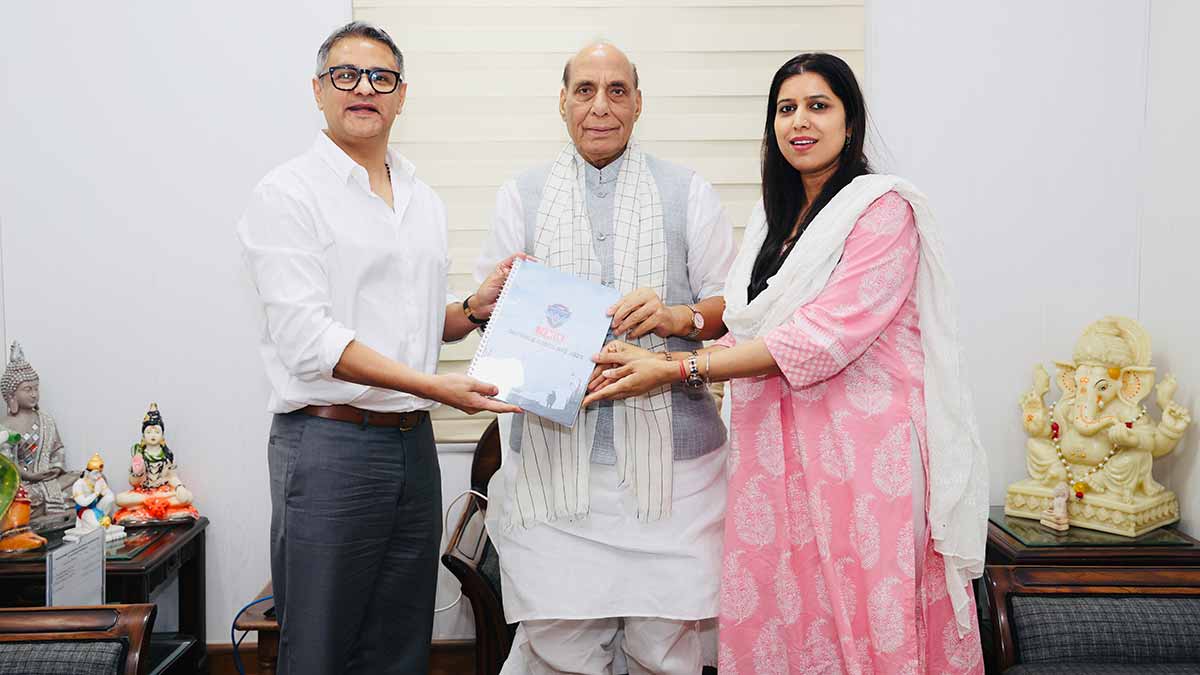Will India have to recalibrate its foreign policy options?
 THE WEEK Chief Associate Editor and Director Riyad Mathew and Chief of Bureau (Delhi) Namrata Biji Ahuja present the report of THE WEEK Defence Conclave to Defence Minister Rajnath Singh.
THE WEEK Chief Associate Editor and Director Riyad Mathew and Chief of Bureau (Delhi) Namrata Biji Ahuja present the report of THE WEEK Defence Conclave to Defence Minister Rajnath Singh.
LET ME BEGIN with a couple of updates for our readers. A few weeks ago, we had conducted the inaugural THE WEEK Defence Conclave at Manekshaw Centre, New Delhi. Last week, a summary of the discussions at the conclave was presented to Union Defence Minister Rajnath Singh by Chief Associate Editor and Director Riyad Mathew and Chief of Bureau (Delhi) Namrata Biji Ahuja. The conclave’s theme was Force of the Future and the report reflects just those aspirations.
Second, this week we are launching a column: Medi-Scene by Dr Preetha Reddy, executive vice chairperson, Apollo Hospitals Enterprise Ltd. In addition to her role at Apollo Hospitals, she is an independent director of Larsen & Toubro Ltd and a member of the India Advisory Council of the Schulich School of Business, Canada. In 2024, she joined the World Bank’s high-level advisory council on jobs, an initiative aimed at addressing the global jobs crisis.
On Page 51, she has begun with a topic that will resonate with all the lovely ladies who read THE WEEK. On behalf of our readers, let me welcome you to India’s largest-selling newsmagazine, dear Preetha.
Let me also congratulate Group Captain Shubhanshu Shukla on being the second Indian gaganaut. It was our honour to put him on cover two weeks ago.
The cover this week is on how India is reshaping its foreign policy in light of the mercurial US President Donald Trump’s recent geopolitical interventions. Many countries are struggling to make sense of him. Only yesterday, June 24, he dropped the F word so casually to the White House press corps. Senior Assistant Editor Sanjib Kr Baruah wrote the main article, and Chief of Bureau (Delhi) Namrata Biji Ahuja interviewed former national security adviser Shivshankar Menon.
The other voices that bolster the cover story include former national security adviser M.K. Narayanan, ambassador K.C. Singh, Seyed Hadi Sajedi from the University of Tehran, Moonis Ahmar from the University of Karachi, Ankita Dutta from the Jawaharlal Nehru University’s Centre for European Studies and Muhammad Amir Rana of the Pak Institute for Peace Studies.
My mind went back to 2018 and the funeral of Senator John McCain, a two-time US presidential aspirant. I was reminded of how the senator, in his own lifetime, picked then-president Barack Obama and former president George W. Bush to deliver his eulogy. This was despite him losing the Republican ticket to Bush in 2000 and the presidential race to Obama in 2008.
In the eulogy, Obama said that it reflected McCain’s mischievous streak. “After all, what better way to get a last laugh than to make George and I say nice things about him to a national audience,” he quipped. I am confident that presidents Joe Biden, Obama, Bush or Bill Clinton would not want Trump on their list of eulogists. That is saying a lot, isn’t it?
While we are on the topic of international politics, let me draw your attention to this week’s Untold Story on veteran journalist Manash Ghosh’s book, Mujib’s Blunders: The Power and the Plot Behind His Killing. Ghosh says that Zulfikar Ali Bhutto poisoned Sheikh Mujibur Rahman’s mind against his closest ally and Bangladesh’s first prime minister, Tajuddin Ahmad.
Senior Assistant Editor Pratul Sharma, Senior Correspondent Nirmal Jovial and Correspondent Badar Bashir look at the bypoll results announced this week—Kadi and Visavadar in Gujarat, Ludhiana West in Punjab, Kaliganj in West Bengal and Nilambur in Kerala. In @leisure, Principal Correspondent Pooja Biraia writes about the world of micro-dramas, tailored for this distracted generation.
And another nice read is K.C. Verma’s column on his struggles with remembering passwords. I am told that one sure way to remember passwords is to use the names of one’s exes.
But people our age might even struggle with that prompt, KC.
Columns